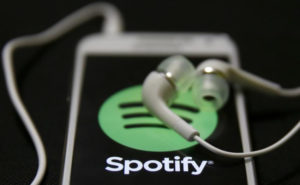 The music industry was so simple before the internet came along. The record company would sign a band, give them an advance to make an album, and then market it. If you wanted to listen to that album, you went into a record store and bought it. The label took their disproportionate cut, but the band still ended up making a decent amount of money. Everybody was a winner. When it came to touring, it was just promotion for the album, that was where all of the cash came from.
The music industry was so simple before the internet came along. The record company would sign a band, give them an advance to make an album, and then market it. If you wanted to listen to that album, you went into a record store and bought it. The label took their disproportionate cut, but the band still ended up making a decent amount of money. Everybody was a winner. When it came to touring, it was just promotion for the album, that was where all of the cash came from.
These days things look completely different. The internet has upended the way that the music industry works entirely. The jury is still out on whether that’s a good thing or not, but regardless of whether you like it or not, the way that you buy and listen to music is wildly different to what it was a couple of decades ago.
It all changed so quickly so that we didn’t have that much time to react to it so there are still a lot of questions to be answered about how we should move forward from here. Recently there have been disputes between artists and streaming services about how much they should be getting paid for their music. While it’s a bit rich for people like Taylor Swift to be complaining about getting underpaid but for the smaller artists, it could be a worry. To really understand what all of these arguments are about and who’s in the wrong, we need to understand exactly how the music industry has changed, and where it is likely to go to next.
Downloads
The emergence of online music downloads is a pretty strange trend because it came about as an illegal thing before being legitimized by record companies. In the early days, there was a lot of backlash from artists and record labels. In 2000, Metallica took out a lawsuit against Napster, the first widespread illegal downloading platform. Dr. Dre jumped on the bandwagon a few weeks later and filed a lawsuit of his own. However, opinion about illegal downloads was split, with some artists believing that free access to music was the future of the industry. Artists including Public Enemy and the Offspring publicly showed their support for Napster during the court case. The argument was that these artists were hugely successful and they were still bringing in massive amounts of cash from live shows and merchandise, not to mention the albums that they were still selling in big numbers. Eventually, the court case was settled and there was an attempt at collaboration between the artists and the new sharing platform. Napster shut down temporarily to rearrange their model and introduce a revenue stream for artists that had their music shared on the site. Unfortunately, they never started up again and in 2002, the company folded and filed for bankruptcy.
In the wake of Napster, a whole new group of illegal downloading sites started popping up and it quickly became clear that there was no way that anybody could stop illegal downloading for good. At the same time, we saw the beginning of legitimate, paid downloads from places like iTunes. As it stands, artists are making big money off paid downloads, but illegal downloading sites are more popular than ever.
Streaming Sites
The ability to download any music that you could think of at the click of a button created new expectations about how people wanted to listen to music. People didn’t want to wait until they could get down to the record store to buy their favorite album. They wanted to listen to everything right now. Downloading was the first step, but when Spotify launched their streaming platform, they changed the game. Now people didn’t need to pick and choose what music they wanted, they had access to millions of songs for a flat monthly rate. Since then, lots of companies have released their own streaming services, most recently Apple. Since phones with internet access have become widespread, listeners are able to access most of the world’s music, wherever they are. It seems as though the days of buying music from a record store are over. The amount of money that artists are making is less than they would from paid downloads or physical sales because the structure of revenue streams haven’t been updated to keep up with new technologies. That’s why we’re getting these disputes, but do they really have a case?
Live Shows Are The New Money Maker
It used to be that concerts were considered a marketing tool to help drive album sales. But now the money that artists make from album sales is dropping, that structure is being flipped on its head. Now, artists are making most of their money from concerts and festivals rather than album sales, and the recorded music generates excitement about the live shows. So, if you want to support your favorite bands, don’t feel bad about downloading their music for free as long as you buy concert tickets online and go to see their shows. The merchandise that they sell at the shows also makes up a large part of their income, that’s probably why the prices for band shirts are so steep!
What Does The Future Hold?
One of the latest trends is sites where people can self-publish their music. The idea has been around for a while, starting with sites like Myspace, but it has become far more popular recently. Soundcloud is one of the more popular places where anybody can upload their own music. In the past, bands needed record labels to pay the recording costs on an album, and market it as well. They had no choice but to accept the huge cut that the label took otherwise their music would never be heard by anybody. Now that people can publish their own music, they have a bit more power over the situation. As long as they can cover the recording costs themselves, they don’t need the record companies as much. Marketing used to be a huge expense, but these days, you can do it for free on social media. At the moment, record labels are still going to get you more exposure most of the time, but in recent years we’ve seen huge stars emerging without any backing whatsoever. Justin Bieber is just one of many artists that were discovered on Youtube. These artists became stars overnight, and without the traditional marketing strategies that record companies usually have to pay for. Unless record labels completely change the way that they operate, they might become completely obsolete in the next decade.



